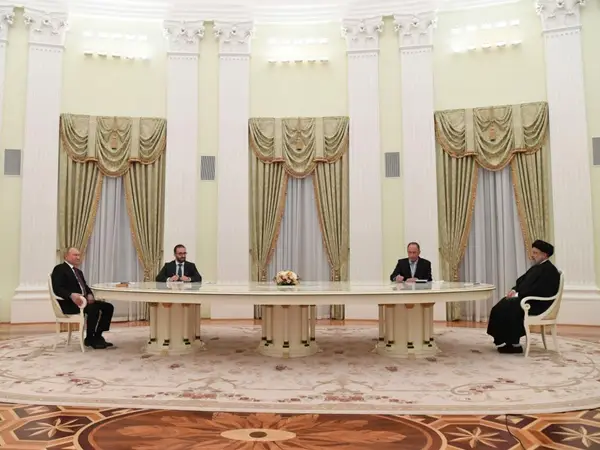The visiting Iranian President Wednesday presented the draft of a 20-year cooperation agreement to his Russian counterpart in Moscow, to update a 2001 version.
“Documents of strategic cooperation can outline the horizons of the [two countries’] relations over 20 years,” President Ebrahim Raisi said after his meeting with Vladimir Putin and presenting the draft.
Iranian officials had for months said preparations for the agreement had been finalized and it would be signed soon when the two presidents met, but last week they said more preparations were required.
Raisi, who arrived in the Russian capital for a state visit at Putin’s invitation, also underlined that his government faces no limitation for expansion and development of ties with the Russian Federation.
"Interaction between Iran and Russia in the region will undoubtedly ensure security and prevent unilateralism. Russia and we are members of many economic and political organizations in the region, such as the Shanghai Cooperation Organization, and Russia plays an important role in these organizations," the Iranian president said Wednesday morning before departing for Moscow.
Raisi praying in the Kremlin
Unilateralism is a term used by the Islamic Republic and others to mean the power and influence of the United States.
"Russia plays a key role in the Eurasian Economic Union, and our cooperation on this track may be effective to promote trade and economic projects," Raisi said. The volume of trade between the countries currently stands at around $3 billion. Tehran says it intends to increase the it to $25 billion.
Putin called Iran an active participant as an observer in the Shanghai Cooperation Organization (SCO) and said Tehran's relations with the Eurasian Economic Union are developing based on an interim agreement. "We are doing active work to establish a free trade zone between Iran and our assembly."
Raisi also praised the cooperation of the two countries in Syria while the Russian president said Moscow and Tehran played a key role in “helping the Syrian government overcome the threats posed by international terrorism.” Tehran and Moscow have both backed the government of President Bashar Assad from the early days of the Syrian Civil War.
According to the official Russian news agency Tass, Putin said at the meeting that he wanted to hear Raisi's position on the ongoing Iran nuclear talks to restore the 2015 deal, the Joint Comprehensive Plan of Action (JCPOA). "It is very important for me to know your position on the JCPOA," he told Raisi.
Raisi said Tehran hopes its efforts will lead to the lifting of US sanctions although "the threat of sanctions can't impede Iran."
Russia is a signatory to the JCPOA and in recent weeks has played a proactive role in the Vienna talks as a mediator between Iran and the United States which is only indirectly involved in the talks.
The Iranian president is expected to speak at Russia’s State Duma and at the Moscow Cathedral Mosque on Thursday.
Before Raisi's visit, Foreign Minister Hossein Amir-Abdollahian said that Tehran followed a “new road map” to deepen ties with Moscow. Amir-Abdollahian also said the Iran and Russia are determined to update their 20-year cooperation treaty of 2001.
"Iran's involvement with Russia on important regional and international issues has eroded US unilateralism. Long-term economic cooperation can be the basis for the formation of new successful experiences," Secretary of Iran's Supreme National Security Council (SNSC) Ali Shamkhani tweeted ahead of Raisi's departure for Moscow.
The visit is taking place in an atmosphere of heightened public debate over the Raisi administration's emphasis to reach a 20-year deal with Russia similar to the 25-year cooperation pact with Beijing signed in March which became operational last week.
